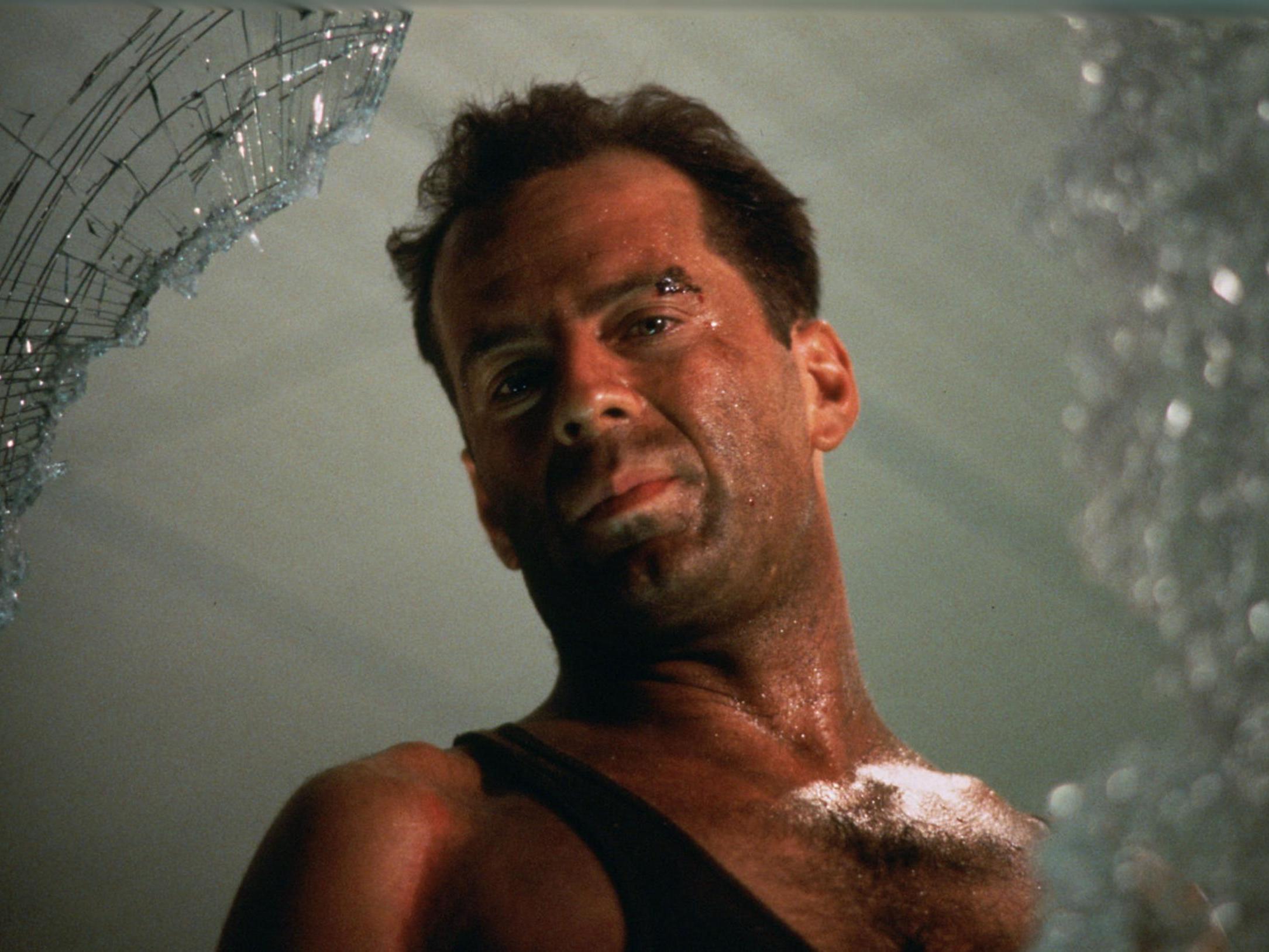The Independent's journalism is supported by our readers. When you purchase through links on our site, we may earn commission.
There’ll never be another action hero like Bruce Willis
As the actor’s family announces that the ‘Die Hard’ star has been diagnosed with frontotemporal dementia, Kevin E G Perry pays tribute to a star who could always be counted on to save the world with a wisecrack


Your support helps us to tell the story
From reproductive rights to climate change to Big Tech, The Independent is on the ground when the story is developing. Whether it's investigating the financials of Elon Musk's pro-Trump PAC or producing our latest documentary, 'The A Word', which shines a light on the American women fighting for reproductive rights, we know how important it is to parse out the facts from the messaging.
At such a critical moment in US history, we need reporters on the ground. Your donation allows us to keep sending journalists to speak to both sides of the story.
The Independent is trusted by Americans across the entire political spectrum. And unlike many other quality news outlets, we choose not to lock Americans out of our reporting and analysis with paywalls. We believe quality journalism should be available to everyone, paid for by those who can afford it.
Your support makes all the difference.Early in 1987, producers Larry Gordon and Joel Silver were on the hunt for an action hero. They were working on a rollercoaster tale about terrorists hijacking a high-rise tower in Los Angeles and the script called for a muscle-bound bruiser.
For contractual reasons, Frank Sinatra was top of the list for Die Hard. Ol’ Blue Eyes had first refusal as he’d been the star of 1968’s The Detective, which like Die Hard was based on author Roderick Thorp’s thriller novels.
When the 70-year-old crooner confirmed his terrorist-fighting days were long behind him, producers went straight to the most obvious candidate: Arnold Schwarzenegger. The Terminator, Commando and Predator star said no, preferring to try his hand at comedy alongside Danny DeVito in Twins. The rejections kept coming: Richard Gere, Burt Reynolds, Harrison Ford, Sylvester Stallone, Nick Nolte, Don Johnson and Mel Gibson all passed.
Way down the list was Bruce Willis. He passed too, citing commitments to Moonlighting, the private detective TV show in which he starred opposite Cybill Shepherd. Then, the fates aligned. “As it turns out, a miracle happened,” Willis told Entertainment Weekly in 2007. “Cybill Shepherd got pregnant and they shut down the show for 11 weeks – just the right amount of time for me to run around over at Nakatomi Tower.”
Willis’s blockbuster turn as John McClane didn’t just change his own life, transforming him overnight from a likeable TV favourite into a bankable A-list movie star, it also redefined what it meant to be an action hero. Before the dawn of Willis, stars of gung-ho Eighties movies had been built like invincible monoliths. His appeal was different: funnier, more vulnerable, more human. He ended up more than earning the $5m Gordon and Silver paid him. “In this crazy world we live in, Bruce was worth the money, every penny,” Gordon told The New York Times in 1988. “For the project to work, you have to feel that the character might not make it, and Bruce is more Everyman than most of your major stars.”
This week, Willis’s family annouced that the actor has been diagnosed with frontotemporal dementia, which is known as FTD. The announcement came almost a year after Willis was first diagnosed with aphasia, leading him to “step away” from acting. It is sad news for anyone who has enjoyed the star’s easy appeal in the decades since he became a household name. Few movie-goers won’t have found him a pleasure on screen. His body of work is long, idiosyncratic and unconstrained by macho ideas about the sort of roles a leading man should take on, perhaps best exemplified by the fact he followed Die Hard by voicing a baby in the John Travolta and Kirstie Alley romcom Look Who’s Talking.
Throughout the Nineties, Willis continued to balance hard-hitting action roles, as in Tony Scott’s manic buddy-cop film The Last Boy Scout, with comedic parts which allowed him to play against type, like the meek, moustachioed Dr Ernest Menville in Robert Zemeckis’s dark beauty satire Death Becomes Her. There was violence in his comedy and comedy in his violence. There are few better examples of Willis’s ability to mine laughs from the depths of darkness than the infamous gimp scene in 1994’s Pulp Fiction. “That was great writing married to frightening violence,” Willis told GQ in 2013. “Just death everywhere. The timing of what gets said and what happens in the ‘This has been a very weird day’ joke, which goes on and on. There’s romance in that for me. Drugs, violence, great writing.”
The huge success of Pulp Fiction helped rejuvenate Willis’s career after notable flops The Bonfire of the Vanities and Hudson Hawk, but he continued refusing to play it safe. There were mind-bending science-fiction capers like Terry Gilliam’s 12 Monkeys in 1995 and Luc Besson’s The Fifth Element in 1997, and he still found time to headline truly massive blockbusters like Michael Bay’s oil-drillers-in-space disaster epic Armageddon, the planet’s highest-grossing film of 1998. The following year Willis changed tack yet again, receiving the best reviews of his career for starring as a child psychologist in M Night Shyamalan’s spooky psychological thriller The Sixth Sense.
In the last decade, Willis’s decision to appear in a long string of poorly-reviewed direct-to-video films has coincided with a dimming of his box office star, but there have still been notable highlights such as working with Wes Anderson on 2012’s Moonrise Kingdom and returning to time-hopping science-fiction in Looper, a film Willis considers his best work. “It’s better than anything I’ve ever done,” Willis told Esquire, heaping praise on Rian Johnson, who would go on to direct Star Wars: The Last Jedi and Knives Out. “Rian did an amazing thing. He conceived an original story. He wrote it, sold it, stuck with it, directed it, and finished it. That’s just tough to do in this town.” Johnson returned the compliment. “He’s such a tremendous actor,” the director told The Hollywood Reporter, singling out Willis’s willingness to subvert his own hard-won reputation. “The fact that he’s Bruce Willis and brings this action star persona works in very interesting ways with this character.”

Watch Apple TV+ free for 7 days
New subscribers only. £8.99/mo. after free trial. Plan auto-renews until cancelled

Watch Apple TV+ free for 7 days
New subscribers only. £8.99/mo. after free trial. Plan auto-renews until cancelled
Willis’s transformative impact on what it means to be an action hero can be seen in the work of a whole host of contemporary stars, from the testosterone-driven performances of Jason Statham and Vin Diesel to the wisecracks of Ryan Reynolds. It is unlikely, however, that any of his heirs apparent will succeed in building a collection of films as diverse, interesting and downright entertaining as Willis’s. He created a genre all of his own, as he made clear at his own Comedy Central Roast in 2018, while clearing up the long-standing controversy over whether Die Hard should be considered a Christmas movie. “Die Hard is not a Christmas movie,” he declared authoritatively to a delighted audience. “It’s a goddamn Bruce Willis movie!”
Join our commenting forum
Join thought-provoking conversations, follow other Independent readers and see their replies
Comments